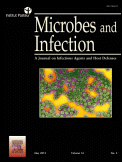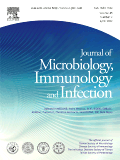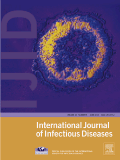
JOURNAL OF INFECTIOUS DISEASES
Scope & Guideline
Unraveling Complexities in Infectious Disease Research
Introduction
Aims and Scopes
- Epidemiology and Public Health:
Research on the distribution, determinants, and control of infectious diseases in populations, including studies on outbreaks, vaccination coverage, and public health interventions. - Clinical Research and Treatment:
Studies focused on clinical outcomes, treatment efficacy, and safety of various therapeutic strategies for infectious diseases, including novel drug therapies and vaccine development. - Microbiology and Pathogenesis:
Investigations into the microbiological aspects of infectious agents, including their genetic makeup, resistance patterns, and mechanisms of infection. - Immunology and Host Response:
Research exploring the immune response to infectious agents, including studies on immune evasion, vaccine responses, and the role of immune cells in disease progression. - Global Health and Infectious Disease Control:
Research addressing the global burden of infectious diseases, aiming to improve control measures and health outcomes in resource-limited settings.
Trending and Emerging
- COVID-19 Research:
A significant increase in studies related to COVID-19, covering various aspects such as epidemiology, clinical outcomes, treatment efficacy, and vaccine development, highlighting the pandemic's ongoing relevance. - Antimicrobial Resistance:
Growing focus on the prevalence and mechanisms of antimicrobial resistance in various pathogens, driven by the urgent need to address this global health crisis. - Vaccine Development and Immunization Strategies:
Emerging research on novel vaccines, including mRNA technology and vector-based vaccines, as well as strategies for improving vaccination coverage and public acceptance. - Zoonotic Diseases and One Health Approach:
Increased attention on zoonotic infections and the interconnectedness of human, animal, and environmental health, emphasizing the importance of a One Health approach to infectious disease research. - Telemedicine and Digital Health Solutions:
A rising trend towards the use of telemedicine and digital health technologies in diagnosing and managing infectious diseases, accelerated by the need for remote healthcare solutions during the COVID-19 pandemic.
Declining or Waning
- Tuberculosis Research:
Although still critical, the frequency of studies specifically dedicated to tuberculosis has decreased in favor of emerging infectious diseases and their management, particularly in the context of the COVID-19 pandemic. - Traditional Diagnostic Techniques:
There has been a noticeable decline in research focusing on older diagnostic methods, such as culture-based techniques, as newer molecular diagnostics and rapid tests gain prominence. - Chronic Infectious Disease Management:
Research on the long-term management of chronic infectious diseases, such as HIV and hepatitis, has seen a reduction as the focus shifts toward acute infectious disease outbreaks and immediate public health responses.
Similar Journals

Emerging Microbes & Infections
Transforming understanding of infectious challenges.Emerging Microbes & Infections is a premier open access journal, published by Taylor & Francis Ltd since 2012, dedicated to advancing the understanding of microbial infections and their implications in human health. With an impressive Q1 ranking across multiple categories—including Drug Discovery, Epidemiology, Immunology, and Infectious Diseases—this journal is at the forefront of research in the microbiological sciences. Covering a diverse range of topics, it serves as a vital resource for researchers, healthcare professionals, and students alike. The journal's commitment to open access ensures worldwide dissemination of cutting-edge findings, fostering collaboration and innovation in tackling challenges posed by emerging infections. As part of the thriving academic community in the United Kingdom, Emerging Microbes & Infections plays a crucial role in shaping the future of infectious disease research and public health.

INFECTION AND IMMUNITY
Empowering Researchers with Cutting-Edge DiscoveriesINFECTION AND IMMUNITY is a distinguished peer-reviewed journal published by the American Society for Microbiology, focusing on groundbreaking research in the fields of infection, immunology, microbiology, and parasitology. Established in 1971, this journal has built a robust legacy, converging years of scientific discovery with a vision towards 2024 and beyond. With an impressive Impact Factor, the journal holds significant rankings in various categories; its Q1 status in both Infectious Diseases and Parasitology underscores its high relevance and quality within the scientific community. Researchers and professionals alike will benefit from its content, as it promotes the latest advances in understanding immune responses and infectious agents, further legitimizing its place among the top quartiles of its respective fields. Access options are provided through traditional subscription models, ensuring a broad charitable dissemination of knowledge. As a pivotal resource for scholars and practitioners alike, INFECTION AND IMMUNITY stands at the forefront of microbiological and immunological research, fostering essential discourse that is crucial for advancing public health and scientific insight.

MEDICAL MICROBIOLOGY AND IMMUNOLOGY
Exploring the dynamic world of microorganisms and immune responses.Medical Microbiology and Immunology is a renowned journal published by Springer, serving as a pivotal resource in the fields of microbiology and immunology. Established in 1971 and continuing its legacy through 2024, this journal features cutting-edge research and reviews that address critical advancements and challenges within these dynamic fields. With an impressive impact factor and a robust ranking, including Q1 categories in both Microbiology (medical) and Immunology, it stands at the forefront of scholarly communication, ranking 21st out of 140 in the realm of Medical Microbiology. Researchers and professionals are encouraged to explore a variety of studies that delve into the interactions between microorganisms and the immune system, making it an essential resource for anyone fascinated by these interconnected realms of health sciences. Although not open access, the journal is widely accessible through institutional libraries, ensuring that significant findings reach a global audience. The University of New York Plaza serves as its operational hub in the USA, reinforcing its international influence and dedication to advancing knowledge in microbiology and immunology.

MICROBES AND INFECTION
Advancing the Frontiers of Microbial ScienceMICROBES AND INFECTION is a premier academic journal published by Elsevier, dedicated to the dynamic fields of immunology, infectious diseases, and microbiology. With a notable impact factor reflective of its high-quality research contributions, the journal is categorized in the Q2 quartile across these fields as of 2023. Based in France and operating since 1999, MICROBES AND INFECTION offers a platform for researchers, professionals, and students to disseminate and access cutting-edge findings that drive innovation and knowledge in microbial and infectious disease research. The journal is ranked impressively within the Scopus database, securing ranks such as #16 in Microbiology and #33 in Infectious Diseases, underscoring its high relevance in the scientific community. Subscribers to the journal can expect an array of articles, reviews, and original research, all designed to advance understanding and improve clinical practices in the fight against infectious agents. With its ongoing commitment to open access options, MICROBES AND INFECTION continues to foster global collaboration and information sharing in the pursuit of addressing pressing microbiological challenges.

TRENDS IN IMMUNOLOGY
Illuminating Key Trends in Immune System StudiesTRENDS IN IMMUNOLOGY, published by CELL PRESS, stands as a premier source of insights and developments within the field of immunology. With an ISSN of 1471-4906 and E-ISSN of 1471-4981, this journal has established a strong reputation, evidenced by its prestigious status in Q1 quartiles for both Immunology and Allergy in 2023. It is ranked #13 out of 233 in the Scopus category of Medicine – Immunology and Allergy, and #16 out of 236 in Immunology and Microbiology, placing it within the top 94th and 93rd percentiles respectively. Since its inception in 1987, TRENDS IN IMMUNOLOGY has provided a critical platform for researchers, professionals, and students to access the latest advancements and integrative reviews in immunological research. The journal offers open access options, enhancing the accessibility of its high-impact content to a global audience. Researchers and practitioners rely on its pages not only for cutting-edge findings but also for comprehensive discussions that drive the future of immunology research.

GERMS
Empowering practitioners with vital insights in epidemiology.GERMS is a multidisciplinary journal published by the EUROPEAN ACAD HIV-AIDS & INFECTIOUS DISEASES, dedicated to advancing knowledge in the fields of epidemiology, immunology, infectious diseases, and microbiology. Since its inception in 2011, the journal has provided a crucial platform for researchers and practitioners to share innovative studies, clinical findings, and public health insights, with an eye on improving health outcomes globally. With an ISSN of 2248-2997 and a consistent publication trajectory leading up to 2024, GERMS is recognized in the third quartile across several categories, reflecting its growing impact and relevance in the scientific community. Authors and readers benefit from a range of access options, fostering the dissemination of vital research findings. As a journal situated in Romania, it also addresses regional health challenges while contributing to the broader discourse on infectious diseases and public health. GERMS is not just a repository of knowledge, but a vital resource for those engaged in combating infectious diseases and promoting health equity.

JOURNAL OF MICROBIOLOGY IMMUNOLOGY AND INFECTION
Leading the charge in infectious diseases research.Welcome to the Journal of Microbiology Immunology and Infection, a premier academic publication established in 1998 and now proudly owned by Elsevier Taiwan. As an Open Access journal since 2016, it provides unrestricted access to groundbreaking research in the fields of immunology, microbiology, and infectious diseases, making it an essential resource for researchers, practitioners, and students alike. The journal holds impressive rankings, including Q1 status in categories such as Infectious Diseases and Microbiology (medical), and a notable 92nd percentile in its Scopus ranking for Medicine - Infectious Diseases. With a dedicated focus on advancing knowledge and fostering collaboration within the scientific community, the Journal of Microbiology Immunology and Infection is committed to publishing high-impact research that significantly influences practice and policy in healthcare and life sciences. The journal is also recognized for its contribution to the ongoing dialogue surrounding contemporary issues in immunology and infection, positioning it as a vital platform for scholarly exchange and innovation.

EUROPEAN JOURNAL OF IMMUNOLOGY
Cultivating Excellence in Immunology ResearchWelcome to the European Journal of Immunology, a premier peer-reviewed journal dedicated to advancing the field of immunology and allergy research. Established in 1971 and published by Wiley, this esteemed journal has been consistently ranked in the top quartile (Q1) across its categories, highlighting its significant impact within the scientific community. With an impressive Scopus ranking, the journal occupies the 64th position in Immunology and Allergy and the 74th in the broader sector of Immunology and Microbiology, demonstrating its vital role in driving innovation and knowledge in immunological studies. The European Journal of Immunology publishes high-quality original research, comprehensive reviews, and insightful commentary, making it an indispensable resource for researchers, healthcare professionals, and students dedicated to understanding the complexities of the immune system. Although not an open-access journal, it offers various subscription options to ensure that institutions and individuals can access pivotal research that shapes the future of immunology.

VIROLOGIE
Illuminating the pathogenesis and epidemiology of viruses.VIROLOGIE is a prominent international journal dedicated to advancing the field of virology and infectious diseases, published by John Libbey Eurotext Ltd. Since its inception in 1997, this journal has provided a platform for researchers and professionals to disseminate their findings on various aspects of virology, including the pathogenesis, epidemiology, and treatment of viral infections. Despite its current ranking in Q4 for both Infectious Diseases and Virology categories, the journal remains a valuable resource for emerging research and novel insights. The ISSN for the journal is 1267-8694, and it is based in France. VIROLOGIE is committed to upholding rigorous academic standards and fosters an inclusive scholarly community, making it an essential read for those pursuing knowledge and advancements in the ever-evolving landscape of virology. While the journal does not currently offer open access options, it continues to contribute significantly to the global discourse on viral research through its diverse range of published studies.

INTERNATIONAL JOURNAL OF INFECTIOUS DISEASES
Elevating the discourse on infectious disease science.INTERNATIONAL JOURNAL OF INFECTIOUS DISEASES, published by ELSEVIER SCI LTD, stands as a leading platform in the realm of infectious diseases, contributing significantly to the global understanding of this critical field. With an impressive impact factor, the journal maintains a distinguished Q1 ranking across various categories, including Infectious Diseases, Medicine (miscellaneous), and Medical Microbiology, demonstrating its high relevance and influence among contemporary research. Since its inception in 1996, it has embraced an Open Access model, allowing for wider dissemination of essential research findings that can inform public health policies and clinical practices. With a commitment to advancing scientific knowledge, this journal is not only a vital resource for researchers and professionals but also serves as an invaluable educational tool for students interested in the complexities of infectious diseases and their management. For those looking to stay at the forefront of research and innovation in this field, the INTERNATIONAL JOURNAL OF INFECTIOUS DISEASES is an indispensable resource.